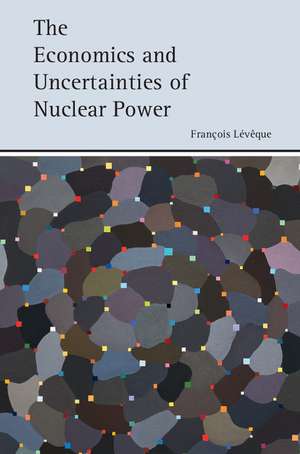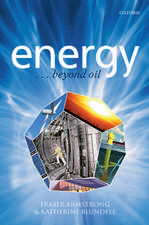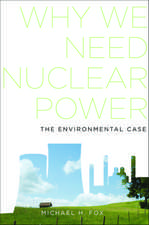The Economics and Uncertainties of Nuclear Power
Autor François Lévêqueen Limba Engleză Hardback – 10 dec 2014
| Toate formatele și edițiile | Preț | Express |
|---|---|---|
| Paperback (1) | 208.35 lei 3-5 săpt. | +17.95 lei 6-12 zile |
| Cambridge University Press – 26 ian 2022 | 208.35 lei 3-5 săpt. | +17.95 lei 6-12 zile |
| Hardback (1) | 468.71 lei 6-8 săpt. | |
| Cambridge University Press – 10 dec 2014 | 468.71 lei 6-8 săpt. |
Preț: 468.71 lei
Preț vechi: 526.64 lei
-11% Nou
Puncte Express: 703
Preț estimativ în valută:
89.69€ • 94.31$ • 74.11£
89.69€ • 94.31$ • 74.11£
Carte tipărită la comandă
Livrare economică 17 aprilie-01 mai
Preluare comenzi: 021 569.72.76
Specificații
ISBN-13: 9781107087286
ISBN-10: 1107087287
Pagini: 350
Ilustrații: 3 b/w illus.
Dimensiuni: 157 x 231 x 25 mm
Greutate: 0.61 kg
Editura: Cambridge University Press
Colecția Cambridge University Press
Locul publicării:New York, United States
ISBN-10: 1107087287
Pagini: 350
Ilustrații: 3 b/w illus.
Dimensiuni: 157 x 231 x 25 mm
Greutate: 0.61 kg
Editura: Cambridge University Press
Colecția Cambridge University Press
Locul publicării:New York, United States
Cuprins
Introduction; Part I. Estimating the Costs of Nuclear Power: Points of Reference, Sources of Uncertainty: 1. Adding up costs; 2. The curse of rising cost; 3. Nuclear power and its alternatives; Part II. The Risk of a Major Nuclear Accident: Calculation and Perception of Probabilities: 4. Calculating risk; 5. Perceived probabilities and aversion to disaster; 6. The magic of Bayesian analysis; Part III. Safety Regulation: An Analysis of the American, French and Japanese Cases: 7. Does nuclear safety need to be regulated?; 8. The basic rules of regulation; 9. What goal should be set for safety and how is it to be attained?; Part IV. National Policies and International Governance: 10. Adopting nuclear power; 11. Nuclear exit; 12. Supranational governance: learning from Europe; 13. International governance to combat proliferation; politics and trade; Conclusion; Index.
Recenzii
'François Lévêque uses his vast academic experience to help us understand the risks, opportunities and uncertainties of nuclear power. Nuclear power is a gamble and that's why we have to think twice. We need books like this one that provide a balanced assessment of our options, which will allow people from any background to engage with the arguments and make up their own minds about this important issue.' Jean-Michel Glachant, Chief-editor of Economics of Energy and Environmental Policy (EEEP) and Director of the Florence School of Regulation
'Francois Lévêque has written an extraordinary and comprehensive book about all aspects of the economics and uncertainties of nuclear power. It covers a wide range of topics including the complexities and uncertainties of capital cost estimation, the reasons for the historical rising costs of building nuclear power plants, the appropriate methods for calculating safety risks, public risk perceptions, the strengths and weaknesses of alternative safety regulatory frameworks, and the successes and failures of international governance arrangements focused on enhancing safety and controlling nuclear weapons proliferation. The book applies state of the art methods drawn from conventional economics, behavioral economics, psychology, political science and statistics. Even if you are not interested in nuclear power per se, the book provides a terrific education about the appropriate modern methods to apply to energy technology evaluation.' Paul L. Joskow, President, Alfred P. Sloan Foundation and Elizabeth and James Killian Professor of Economics, Emeritus, Massachusetts Institute of Technology
'François Lévêque has provided us with exactly what is needed for a sober evidence-based assessment of the strengths and weaknesses of the role that nuclear power might play in climate change mitigation. Lévêque draws on recently released French data on costs as well as evidence from the rest of the world to look at the past and prospective future costs, potential and risks of nuclear power. His admirable aim is to clarify the uncertainties that all claims face to better inform and de-politicise the debate.' David Newbery, Emeritus Professor, University of Cambridge, and Director of the Energy Policy Research Group, University of Cambridge
'Professor Lévêque's book is an excellent choice for inquiring minds looking for a fresh approach to the economics of nuclear power. Chapter 6 alone is worth the price of the book. In it, Professor Lévêque introduces the reader to Bayesian analysis and shows how to incorporate nuclear accidents during the last 35 years into the calculation of the probability of a future nuclear accident. The book fills an important niche in educating the public, university students, and decision makers about how to think about the costs, benefits and risks of nuclear power.' Geoffrey Rothwell, Principal Economist, Nuclear Development Division, OECD/Nuclear Energy Agency (NEA); formerly of Stanford University
'… [an] excellent, accessible, and thorough primer on the policy issues surrounding nuclear power … a text highly recommended for courses in energy policy and safety regulation, and for readers interested in nuclear power as an alternative to fossil fuels.' T. Brennan, Choice
'Francois Lévêque has written an extraordinary and comprehensive book about all aspects of the economics and uncertainties of nuclear power. It covers a wide range of topics including the complexities and uncertainties of capital cost estimation, the reasons for the historical rising costs of building nuclear power plants, the appropriate methods for calculating safety risks, public risk perceptions, the strengths and weaknesses of alternative safety regulatory frameworks, and the successes and failures of international governance arrangements focused on enhancing safety and controlling nuclear weapons proliferation. The book applies state of the art methods drawn from conventional economics, behavioral economics, psychology, political science and statistics. Even if you are not interested in nuclear power per se, the book provides a terrific education about the appropriate modern methods to apply to energy technology evaluation.' Paul L. Joskow, President, Alfred P. Sloan Foundation and Elizabeth and James Killian Professor of Economics, Emeritus, Massachusetts Institute of Technology
'François Lévêque has provided us with exactly what is needed for a sober evidence-based assessment of the strengths and weaknesses of the role that nuclear power might play in climate change mitigation. Lévêque draws on recently released French data on costs as well as evidence from the rest of the world to look at the past and prospective future costs, potential and risks of nuclear power. His admirable aim is to clarify the uncertainties that all claims face to better inform and de-politicise the debate.' David Newbery, Emeritus Professor, University of Cambridge, and Director of the Energy Policy Research Group, University of Cambridge
'Professor Lévêque's book is an excellent choice for inquiring minds looking for a fresh approach to the economics of nuclear power. Chapter 6 alone is worth the price of the book. In it, Professor Lévêque introduces the reader to Bayesian analysis and shows how to incorporate nuclear accidents during the last 35 years into the calculation of the probability of a future nuclear accident. The book fills an important niche in educating the public, university students, and decision makers about how to think about the costs, benefits and risks of nuclear power.' Geoffrey Rothwell, Principal Economist, Nuclear Development Division, OECD/Nuclear Energy Agency (NEA); formerly of Stanford University
'… [an] excellent, accessible, and thorough primer on the policy issues surrounding nuclear power … a text highly recommended for courses in energy policy and safety regulation, and for readers interested in nuclear power as an alternative to fossil fuels.' T. Brennan, Choice
Notă biografică
Descriere
An in-depth and balanced economic analysis of the costs, hazards, regulation and politics of nuclear power.











